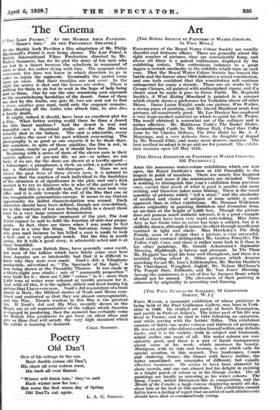The Cinema
r THE LOST PATROL2' AT METE MARBLE ARCH PAVILION. NOAHS ARK." AT THE PICCADILLY THEATRE.]
67. the Marble Arch Pavilion a film adaptation of Mr. Philip gardonald"s Petal is now being shown. The Lost Patrol, a British International Films Production directed by Mr. Walter Summers, has for its plot the story of ten men who are lost in a desert because the subaltern in command of them is shot, his orders dying with him. The sergeant takes command, but does not know in which direction to go in order to rejoin the regiment. Eventually the patrol come upon an oasis. But their troubles are not over. In the night the sentry is shot and the horses are stolen. There is nothing for them to do but to wait in the hope of help being sent to them. One by one the nine remaining men succumb to the overwhelming hardships of the desert. Some of theirs are shot by the Arabs, one gets iii, two are sent out to find a river, another goes mad, until only the sergeant remains. After shooting all the Arabs who attack him, he also dies a lonely death. It might, indeed it should, have been an excellent plot for a film. What better setting could there be than a desert for this fluent medium ? And the desert is real and beautiful—not a theatrical studio set—for the film was actually shot in the Sahara. The cast is admirable, every actor makes the most of his part without over-acting. The photography is as good as one expects it to be these days. But somehow, in spite of these qualities, the film is not, in ary opinion, nearly as good as it should have been.
Beginning with a series of shots of the eleven men in their various spheres of pre-war life, we see or rather, we are lucky if we see, for the shots are shown at a terrific speed- s fishmonger, a ploughman, a clerk, an artist, a public school boy, a Salvation Army tub-thumper, &c. Since we are shown the past lives of these eleven men, it is natural to suppose that the reaction of each individual to the hardships of the situation is of significance in the plot, and one's first instinct is to try to discover who is who of the patrol in the desert. But this is a difficult task, for all the men look very alike, and it is only towards the end of the film that one or two recognizable personalities emerge. It seems to me that an opportunity for skilful characterization was missed. Each character should have been defined, though not over-defined, for in the reactions of ten men facing death in a desert there must be a very large common denominator.
In spite of the realistic treatment of the plot, The Lost Patrol cannot be said to fulfil the functionof anti-war propa- ganda. In fact, there are times when I was made to feel that war is a very fine thine. The Salvation Army fanatic who goes mad because he has killed a man is made to look a fool—not a very pleasant touch. But the film is worth seeing, for it tells a good story, is admirably acted and is at times beautiful.
Silent films, even British films, have generally some merit, but most of the tallies which have lately come over here from America are so intolerably bad that it is difficult to know why they were ever made. Noah's Ark, a Vitaphone production, advertised " The Spectacle of the Ages," is now being shown at the Piccadilly Theatre. It was made in a thirty-eight acre studio ; sets of " mammoth proportion " were built for it ; there are .7,500 " extras " in it ; more than 1,400 tons of water were released at terrific pressure for it. And, with all this, it is the ugliest, silliest and most boring big picture that I have ever seen. Noah's Ark is a mixture of a train smash in Italy, the Biblical stories of Noah and Moses corn- blued and contorted so that they are almost unrecognizable, and the War. Trench warfare in this film is the greatest fun. If Noah's Ark and My Man, recently shown at the Regal, are at all representative of the talkies which America is engaged in producing, then the moment has certainly come for British film producers to get busy on silent films and give us films that will satisfy the very high standard which the public is learning to demand. CELIA SIMPSON.






































 Previous page
Previous page